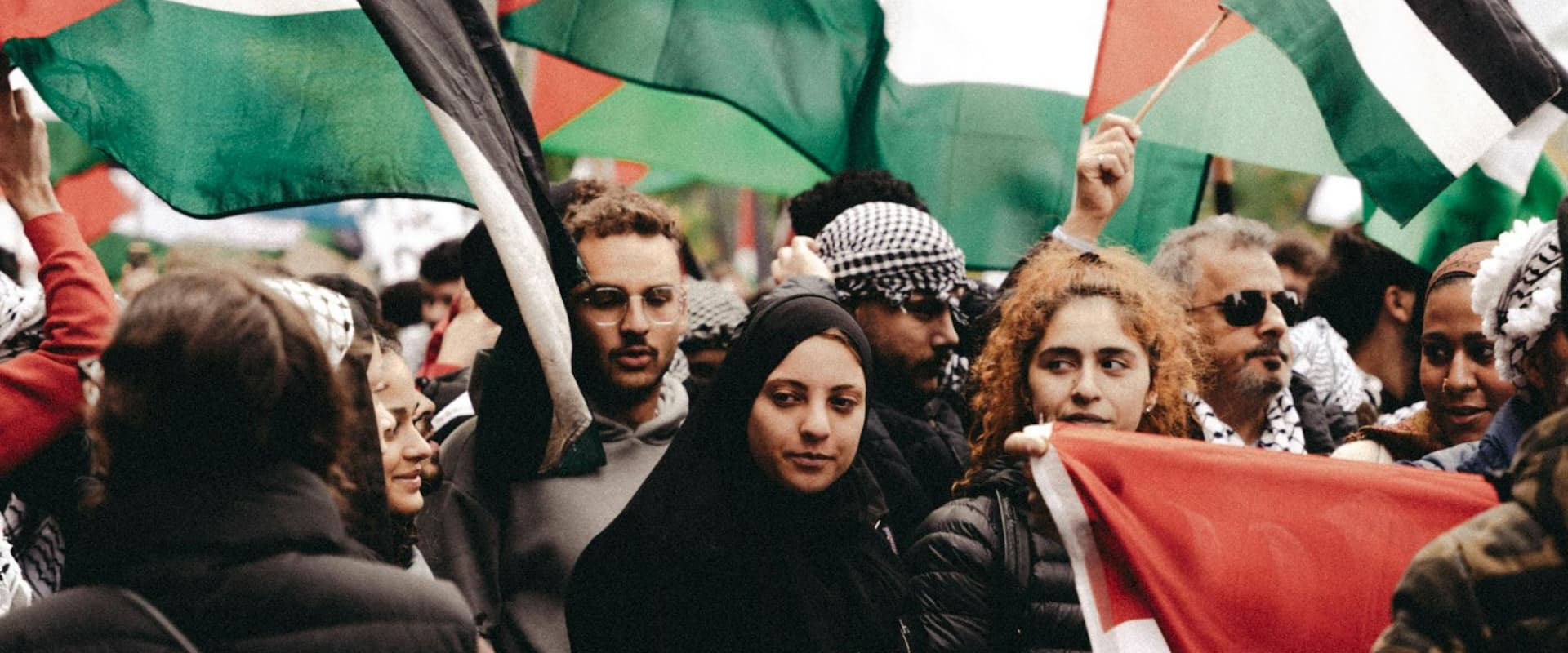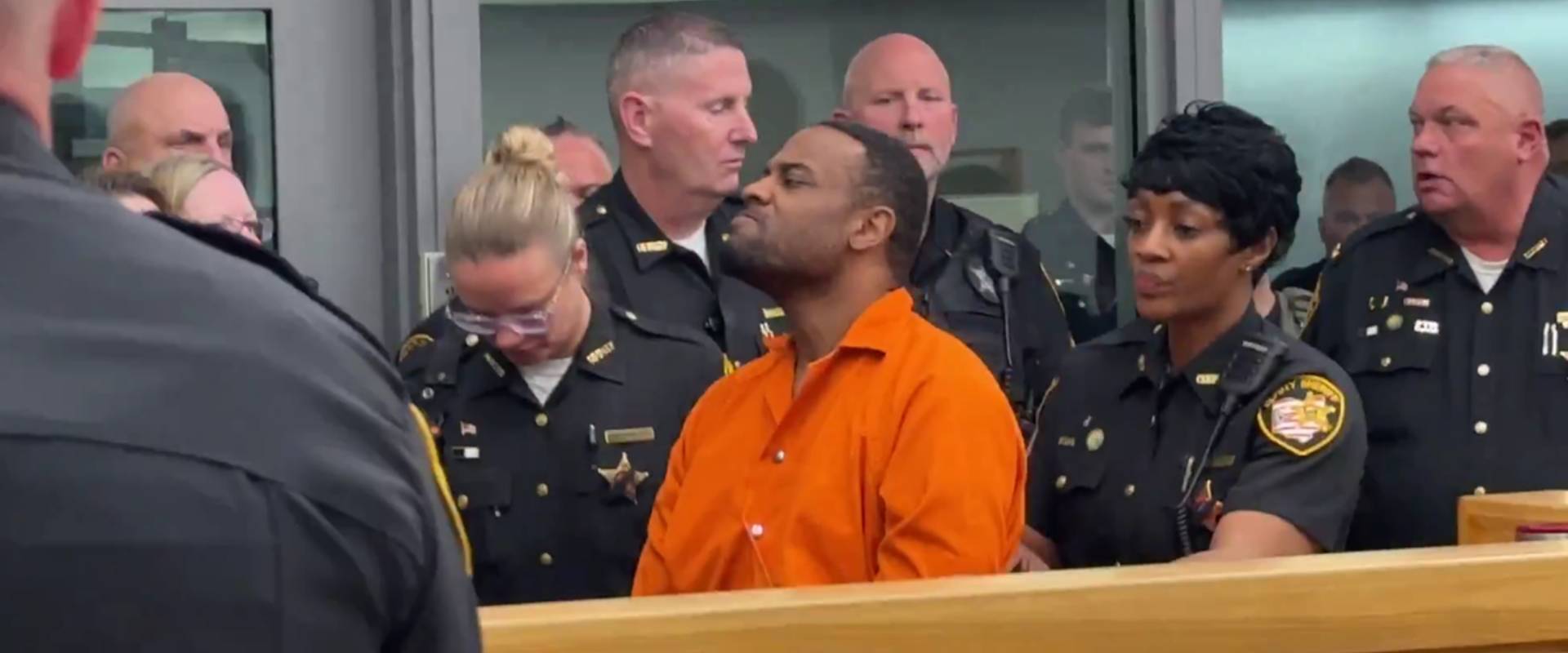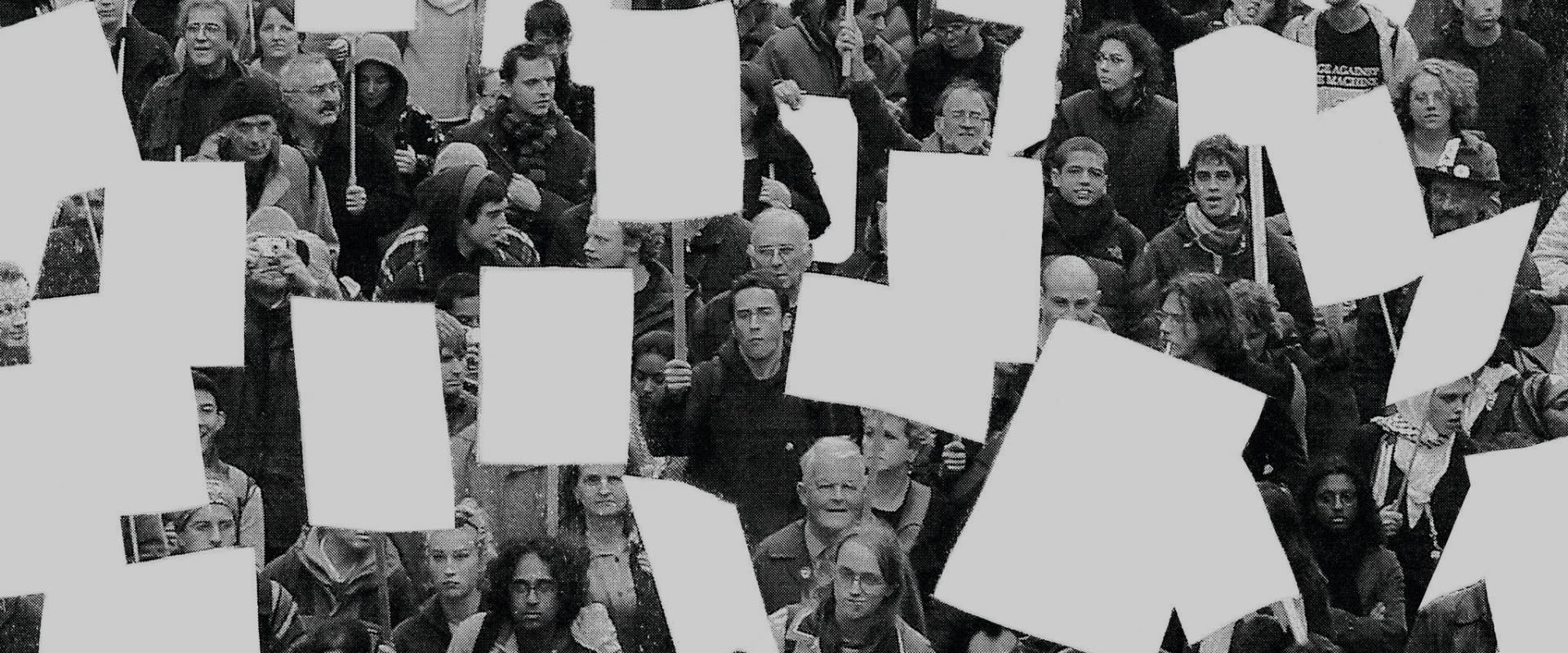What will it take to liberate Palestine? It starts, of course, with the heroism and sumud (steadfastness) of Palestinians we’ve witnessed over the past 75 years. That’s why Firebrand supports Palestinian resistance in all its forms.
But international action is also essential. The Zionist entity has always depended on support from an imperial patron — currently the United States — to keep going. It serves as a “watchdog” in the region to defend said patron’s control of the Middle East. Regional revolutions like the Arab Spring of 2011–2014 and global protest campaigns like the Boycott, Divestment, and Sanctions (BDS) movement have been important in isolating and undermining the Zionist colonial project.
Crucially, amid Israel’s brutal assault on Gaza over the past year, a solidarity movement has blossomed in the US that is politically radical, tactically militant, and unwavering in its commitment to Palestinian liberation.
From passive participants to trained organizers
So how can we make our solidarity movement the strongest it can be? The short answer is that our power is in our numbers.
If we want to shut down a street to protest, it’s easier to do that with 1,000 people than with 10 people. If we want to go on strike as tech workers to drop our bosses’ ties to the apartheid state, we can only do that if we have enough of our co-workers joining in.
Many people understand this and have made conscious attempts to make Palestine a cornerstone of all types of activism. Students in particular have done incredible work building broad coalitions and encampments on campuses across the country — uniting Palestinian and anti-Zionist Jewish organizers with Black student unions, immigrant rights groups, LGBTQ+ collectives, and more.
As long as there is a wide gulf between someone who supports Palestine solidarity actions and someone who organizes those actions, the core of committed people won’t expand. We won’t reach wider and wider circles of people, and more and more sections of society
It can be frustrating to do all this work, or to witness and share the daily dose of distressing news from Gaza, and struggle with how to expand the movement. After we re-share all the content and calls to action and see protests start shrinking, a voice inside us can creep up — a voice that wants to write off broader masses of people as hopelessly ignorant or complicit.
But to build a large movement, it’s not enough to just make some social media posts, put up flyers, or even build coalitions. We need to constantly turn more and more people from passive participants into trained organizers.
As long as there is a wide gulf between someone who supports Palestine solidarity actions and someone who organizes those actions, the core of committed people won’t expand. We won’t reach wider and wider circles of people, and more and more sections of society. We will continually rely on “big moments” like the invasion of Rafah to get people active, and then see them return to passivity after the moment passes.
These ups and downs, the mass outpouring and then back into passivity, are a built-in feature of social movements. Consciousness is never uniform nor static under capitalism. People hold in their heads both what they’re told, with capitalist control of education and media as a given, and what they see and experience in their lives as a worker, student, member of an oppressed group, etc. The balance on that arithmetic goes through all sorts of permutations and changes — especially during periods like the past nine months’ genocide. That, in turn, shapes their behavior.
However, that doesn’t mean we are helpless to influence that process. Organization plays an essential role in evening out the peaks and troughs and advancing people’s consciousness and activity. This is true of both broader movement organizations and revolutionary ones.
Instead of riding the ups and downs of people’s participation, our movement needs ways to draw people into activity, train them as organizers, and involve them in decision-making and debate through democratic spaces.
Why democracy is essential to the movement
Why widen spaces for decision-making, debate, and democracy? There are two reasons.
First, debate and democracy allow us to deepen the politics and commitment of our movement. To truly become an organizer, you need to test out your ideas with others. You can’t feel truly confident in your ideas (not just falsely confident) if you’re not forced to explain and argue them to others, while also considering theirs.
You also need to feel like your ideas and contributions can make an impact — otherwise, why put in the time and effort? Democracy allows us to learn from others in a way that shapes the politics of the whole movement. It allows us to cultivate and grow these politics instead of quietly carrying them in our heads or posting on social media.
People will enter the movement with all sorts of prejudices and “wrong” ideas. Given the power of the capitalist media and education to pump out reactionary ideas, that’s natural with any movement with a truly mass character. Debate allows us to duke it out with the bad ideas and win people over to the good ones — all while treating them as serious and valuable comrades in the struggle.
Debate and democracy allow us to deepen the politics and commitment of our movement. To truly become an organizer, you need to test your ideas out with others.
Second, we need democracy because the struggle is difficult. The forces stacked against us have many tools at their disposal — repression, co-optation, surface-level concessions, and more — to try and strangle our movement. There are always different ideas about how to deal with these problems in a given moment. Is this a time to advance, or retreat? Debate and democracy allow us to take full stock of a situation — including information we might not have had otherwise with only a few people in a discussion — get on the same page, and move forward together.
The damaging influence of security culture
What about security? These concerns are valid. We know all too well about Zionist and state threats, including doxxing, disruptions, and physical violence. But so long as security becomes the overriding concern to the point we are afraid to organize a broad and powerful movement, we are doing our enemies’ job for them.
While it might seem like common sense that a broad movement would mean sacrificing security, the opposite is true. The more people in the movement, the harder it is to repress. It’s literally harder to dox, jail, or bludgeon 10,000 people than 100.
But more than that, the more our movement grows, the more we can assert our power in key places. In 2020, the George Floyd Rebellion’s mass character led union bus drivers to refuse to bus arrestees to jail for the cops. Could tech workers shut down doxxing sites like Canary Mission?
Conversely, overemphasizing tactical security can actually create bigger barriers for new people to join and help grow the movement, which keeps things smaller and less safe for all of us. If every action is treated as an arrestable situation that demands perfect op-sec, anyone new to activism but passionate about stopping the genocide would have to overcome those fears to join our campaign. In such cases, many balk and stay away.
While we should make clear the seriousness of our struggle and the threats we face, breaking down the binary of passive supporters and active organizers starts with educating more and more people through direct participation in this struggle.
As history teaches us, building a mass response to repression can be crucial in broadening the movement too. Defending someone’s right to free speech — even as inherently limited as that right is under capitalism, and even when our main focus is the genocide — can be an entry point for many who otherwise would have sat on the fence.
The failures of undemocratic organizing
Even still, we don’t see democracy flowering everywhere. While security isn’t actually an obstacle, there are forces in our movement that buck against bottom-up democratic functioning — even while they may verbally advocate it.
Unfortunately, thanks to working-class self-organization being very weak, much of the social-movement left is dominated by NGOs — the “nonprofit industrial complex.” These organizations’ constant quest for philanthropic funding, their reliance on paid staffers, the limitation of their tactics to the realm of the “acceptable” — all of these things push them away from bottom-up democracy.
Even if some individual non-profit staffers can be well-meaning and even radical in their politics, the logic of their work often leads them to keep those views quiet and manage the movement from the top down.
Likewise, other parts of the socialist left also suffer from a fear of democracy. Some socialist groups operate in and alongside their front groups — nominally independent, seemingly broader groups that these socialists in fact control.
Bureaucratic maneuvering, limiting debate, and hiding one’s true identity as socialists may work for a time, but they do nothing to build the capacity of regular people to consciously liberate themselves. Some socialists doubt and fear how masses of people might act without their “benevolent” guiding hands.
Revolutionary leadership is ultimately necessary to win even modest reforms, but between us and them the question is how. In a democratic movement, leadership and people’s confidence in it are secured in the course of struggle and open debate. We believe we must prove our right to lead. However, these front-group socialists — including the Party for Socialism and Liberation (PSL) with ANSWER and Freedom Road Socialist Organization (FRSO) with SDS — seek to impose their leadership instead. Bureaucratic maneuvering, limiting debate, and hiding one’s true identity as socialists may work for a time, but they do nothing to build the capacity of regular people to consciously liberate themselves. Whether they want to admit it or not, these socialists doubt and fear how masses of people might act without their “benevolent” guiding hands.
On the other hand, freedom without structure can be both undemocratic and limiting. As we have seen in the Occupy movement, the Democratic Socialists of America, and elsewhere, where democracy doesn’t include follow-through and leadership goes undiscussed, a kind of “tyranny of structurelessness” can reign. Individualistic approaches to organizing (“I won’t follow the majority’s decision because I disagree with it”) merely reinforce the atomization that capitalism imposes upon us every day, rather than build a powerful mass movement.
Our discussions, debates, and votes, if they are to mean something, have to be backed up by actions. Leadership, to be accountable and trustworthy, has to be subject to some kind of democratic process. Movements are always full of a diversity of tactics — sometimes we’ll need to take a bridge, sometimes we’ll need to just hand out leaflets — but we will always need space to assess these tactics, debate their use, and decide together.
A democratic agenda for the movement
Here, then, are some concrete ideas for building a broader, more democratic Palestine solidarity movement, some of which are already being done in some places:
- Create clear ways for people to get involved. Hold in-person and online introductory forums for people to learn about the principles of Palestine solidarity, the work being done, and how they can participate.
- Create spaces for debate and discussion as well as action. What should the Palestine movement say about the 2024 election? What does Palestinian liberation look like, and how do we get there? How does the international situation right now make Palestinian liberation more or less likely? Hash out debates to clarify the way forward.
- Train people in the politics and activity of the Palestinian liberation movement. Hold reading groups on Palestine: A Socialist Introduction, Omar Barghoutti’s BDS, Ilan Pappé’s Ten Myths About Israel, or other important works. Have experienced organizers pair up with newer people to support their growth.
- Create committees for different sectors of the movement, united in a fuller movement assembly. Create committees for neighborhoods (or link up with different existing neighborhood groups), student committees, labor committees, etc. Give those committees representation in a movement executive, for example. Allow members of those committees to meet together in a larger assembly to help shape and determine the direction of the movement.
- Consider ways to create broad coalitions to respond to repression. Use a minimum set of demands (e.g. defending free speech and privacy) to bring in potential fence-sitters, and create opportunities to bring that broad base closer to the Palestine movement.
There are many more possibilities for making the Palestine solidarity movement bigger and more widely organized. All in all, the principle that we in Firebrand argue is this: the more democracy and more genuine involvement from large numbers of people, the stronger our movement will be.



